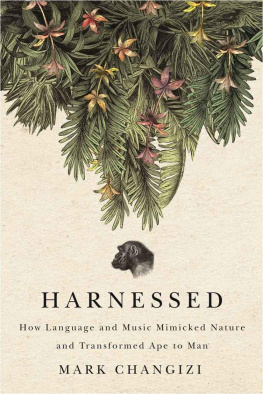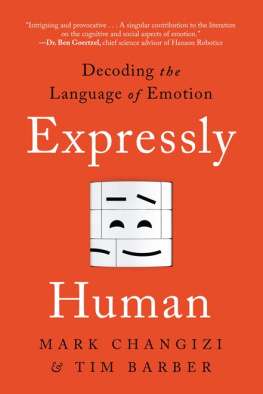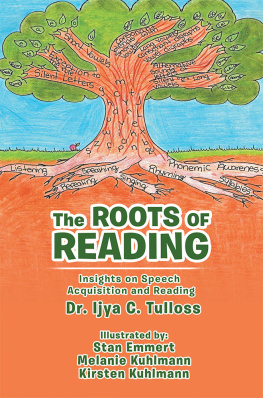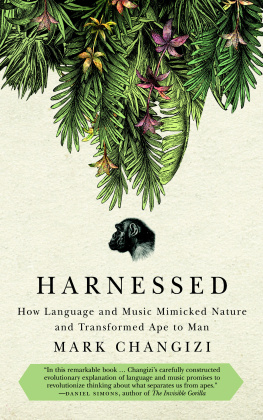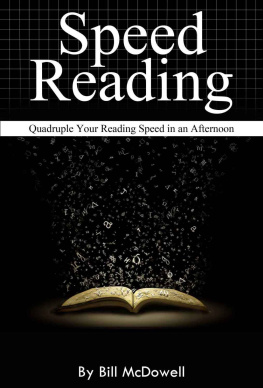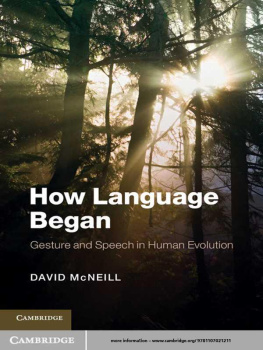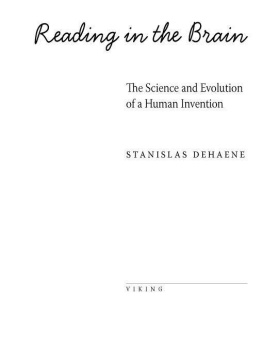Praise for Mark Changizi and Harnessed
The theoretical neurobiologist Mark Changizi has a dazzling ability to change the way we think by providing compelling answers to big, important questions that had never occurred to most of us in the first place.
Roger Highfield , editor of New Scientist and co-author of SuperCooperators
In this remarkable book, Mark Changizi performs surgery on the mind, revealing nothing less than the origins of the abilities that make us human. And his conclusions are both provocative and surprising: The uniquely human facility with language and the universal human propensity to create and enjoy music came about not through biological adaptation, but through cultural evolution. Human culture harnessed what our brains already did wellperceiving physical events and human movements. Changizis carefully constructed evolutionary explanation of language and music promises to revolutionize thinking about what separates us from apes.
Dan Simons , co-author of The Invisible Gorilla
Among the abundant theories on the origins of language and music, Mark Changizis book is unique in proposing a very precise hypothesis that leads to many testable and surprisingly accurate predictions. Bold, speculative, highly stimulating and entertaining, this book might hold a key to one of humanitys longstanding mysteries.
Stanislas Dehaene , author of The Number Sense and Reading in the Brain
Mark Changizi is always daring and original, and his theory of how we learned language and music from nature is truly unique, opening up our ears and eyes to a whole new vision of humanity.
David Rothenberg , author of Survival of the Beautiful and Why Birds Sing
Harnessed is one of the most interesting and original books Ive read in the past few years. Changizi is an excellent writer, a compelling theorist, and relentless and ingenious in seeking evidence to back his theories. His approach to music is at once quite different from other work in the field and yet accessible and intelligible. He has answers where others dont even know how to ask questions. What I like about his approach is that he shows how a brain that has been shaped in certain ways has latent capabilities that can be harnessed to tasks that are different from those that shaped it. That is an important idea and is certain to yield further insight.
William Benzon , author of Beethovens Anvil: Music in Mind and Culture
A rich tapestry of hypotheses about why language and music sound the way they do.
Gary Marcus , professor of psychology at New York University, and author of Kluge: The Haphazard Evolution of the Human Mind
Praise for The Vision Revolution
The novel ideas that Mr. Changizi outlines in The Vision Revolution together with the evidence he does presentmay have a big effect on our understanding of the human brain. Their implication is that the environments we evolved in shaped the design of our visual system according to a set of deep principles. Our challenge now is to see them clearly.
The Wall Street Journal
The writing style is clear and captivating; the illustrations are nicely done and helpful. Choice
Throughout the book, Changizi peppers his explanations with quick, fascinating visual exercises that help to drive his points home.... One thing is certain: The Vision Revolution will make you wonder the next time you notice someone blush, catch a ball or finish reading a magazine page.
Scientific American MIND
Filled with optical illusions and simple experiments for the reader to perform, this book may be the most fun youll have learning about human cognition and evolution.
The Barnes & Noble Review online publication
The Vision Revolution is essential science writing, not because the ideas are definitely correct, but because the book can give the ordinary reader an glimpse of how science can work. Changizi is unusual in the range and quality of his ideas, and the clarity and humour with which he can lay them out; but the real value of this book is in the excitement of the scientific process that it conveys. The Psychologist
The book contributes an interesting set of new ideas that are explained in a way that should engage a wide range of readers.
The Quarterly Review of Biology
... fascinating book New Scientist
... challenges common notions regarding sight... keep[s] them... dazzled. Publishers Weekly
... see how a masterful theorist revisualizes one of the oldest subdisciplines of psychology. PsychToday

Harnessed
How Language and Music Mimicked Nature and Transformed Ape to Man
Mark Changizi

BenBella Books, Inc.
Dallas, Texas
Copyright
Copyright 2011 by Mark Changizi
All rights reserved. No part of this book may be used or reproduced in any manner whatsoever without written permission except in the case of brief quotations embodied in critical articles or reviews.

BenBella Books, Inc.
10300 N. Central Expressway, Suite 400
Dallas, TX 75231
benbellabooks.com
Send feedback to
Printed in the United States of America
10987654321
Library of Congress Cataloging-in-Publication Data is available for this title.
ISBN 978-1-935618-53-9
Editing by Erin Kelley
Copyediting by Annie Gottlieb
Proofreading by Michael Fedison
Cover design by David Drummond
Text design and composition by Neuwirth & Associates, Inc.
Printed by Berryville Graphics
Distributed by Perseus Distribution
perseusdistribution.com
To place orders through Perseus Distribution:
Tel: 800-343-4499
Fax: 800-351-5073
E-mail:
Significant discounts for bulk sales are available.
Please contact Glenn Yeffeth at or (214) 750-3628.
Contents
Introduction The Reading Instinct

Introduction
The Reading Instinct
A t the beginning of his book The Language Instinct , Steven Pinker demonstrates the amazing power of language with an example. He writes:
The [language] ability comes so naturally that we are apt to forget what a miracle it is. So let me remind you with some simple demonstrations. Asking you only to surrender your imagination to my words for a few moments, I can cause you to think some very specific thoughts:
When a male octopus spots a female, his normally grayish body suddenly becomes striped...
Cherries jubilee on a white suit? Wine on an altar cloth? Apply club soda immediately...
When Dixie opens the door to Tad, she is stunned, because she thought he was dead...
With just a handful of words, our brains are pulled hither and thither to far-off corners of a vast mental universe, and new content is installed. For me, the Dixie-and-dead-Tad story from All My Children is old news, but a few of you may not have known Tad is alive. And now you know, from just a few words in the right order.
That kind of brainpower doesnt happen by accident, Pinker argues. The deeply malleable, blank-slate brains the social sciences have long supposed we possess could never learn and do language as we can. Language is astoundingly complicatedto this day, we cannot build effective speech-recognition machinesand yet we are uncannily good at it: children learn language too quickly and easily, we all comprehend it too automatically and effortlessly, and it pervades our life too completely to be something we simply learn with general-purpose brains. And our brains, indeed, have long appeared to have specialized regions for language. That we have an instinct for language is also suggested by its universality: language is found everywhere, and languages tend to share many common features.

